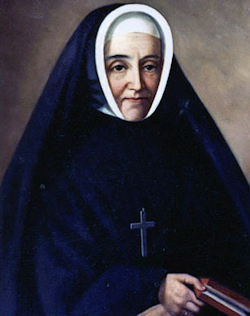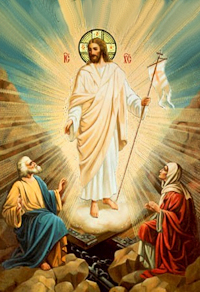Easter: April 18th
Thursday of the Third Week of Easter
Other Commemorations: Bl. Marie-Anne Blondin, Virgin (RM; Optional Memorial in CAN)
» Enjoy our Liturgical Seasons series of e-books!
Today the Church in Canada celebrates the Optional Memorial of Blessed Marie-Anne Blondin (1809-1890), the foundress of the Congregation of the Sisters of Saint Anne. Her work established universal education, so that there was a standard for both boys and girls, and men and women could teach both. She suffered greatly from persecution from the order's chaplain and from within the order, but remained humble and dedicated to God's work, instead of pushing back to be prominent in leadership. She died of natural causes at the age of 81 and was beatified on April 29, 2001 by Pope St. John Paul II.
Meditation for Thursday in the Third Week of Easter
Redemption
1. "Alleluia. The Lord hath sent redemption to His people, alleluia." The Mass of the third Sunday after Easter is built on this theme; it is permeated by the spirit of gladness. "Shout with joy to God, all the earth, alleluia. Sing ye a psalm to His name, alleluia" (Introit). Easter, the resurrection of the Lord is our awakening to a new life of grace. It brings us the promise that we shall one day awaken to a life of glory. "How terrible are Thy works, O Lord!" (Introit.) "Praise the Lord, O my soul. In my life I will praise the Lord" (Offertory).
2. "The Lord hath sent redemption to His people." This deliverance is first of all from the tyranny of the flesh. "Dearly beloved, I beseech you, as strangers and pilgrims, to refrain yourselves from carnal desires, which war against the soul." "Therefore, brethren, we are debtors, not to the flesh to live according to the flesh, for if you live according to the flesh, you shall die; but if by the spirit you mortify the deeds of the flesh, you shall live... The wisdom of the flesh is the enemy of God, for it is not subject to the law of God; neither can it be. And they who are in the flesh cannot please God" (Rom. 8:12 f., 7 f.). Through the holy sacraments of baptism, penance, and the Eucharist, the Lord has made it possible for us to "refrain from carnal desires." Mary and Joseph are shining examples of unsullied purity and perfect chastity and virginity; they were perfectly detached from all inordinate worldly desires. They overcame the unruly tendencies toward pride, impatience, anger, envy, self-love and self-seeking. Their lives were pure and devoted to the love of God and of Christ. Their one concern in life was to do the will of God and what was pleasing to Him. They were victorious over the desires and the movements of the flesh. They were truly redeemed."The Lord hath sent redemption to His people." God has given us also the power to overcome our lower sensual nature, our passions and our evil inclinations. We are redeemed. Though by ourselves we are weak and helpless, we are yet able to overcome our evil inclinations and to conquer in the struggle for purity and holiness. "I can do all things in Him who strengtheneth me" (Phil. 4:13). Ah, had we but the deep living faith so evident in the liturgy! "The Lord hath sent redemption to His people, alleluia."
"Have your conversation good among the gentiles." That is the admonition given by St. Peter in the Epistle. In truth, "you are the light of the world" (Matt. 5:14). "For you were heretofore darkness, but now light in the Lord. Walk, then, as children of the light (Eph. 5:8). "So let your light shine before men that they may see your good works and glorify your Father, who is in heaven" (Matt. 5:16); that is, may they learn to know God and Christ and be led to them. A holy mission indeed! "For so is the will of God, that by doing well you may put to silence the ignorance of foolish men." The Epistle further commands us explicitly to obey our legitimate rulers "Be ye subject, therefore, to every human creature for God's sake." Christian freedom does not release us from the authority of the state or the Church, or from the obligations of our state of life. Furthermore, this Epistle admonishes us to honor everyone and to practice fraternal charity: "Honor all men; love the brotherhood; fear God; honor the king." Finally we are commanded to be subject to authority, whether that authority treat us justly or unjustly: "Servants, be subject to your masters with all fear, not only to the good and gentle but also to the forward. For this is thankworthy." How diligently Joseph and Mary followed such a life of perfect submission! They feared God, prayed, rendered perfect obedience externally and internally to legitimate authority, were humbly subject to all men, often under the most trying circumstances Such a life of submission is the fruit of Easter, the fruit of baptism, of the Eucharist, and of the grace we received through our resurrection with Christ. Why should not this life be possible to me? "The Lord hath sent redemption to His people."
3. "The Lord hath sent redemption to His people." Therefore "shout with joy to God, all the earth, alleluia; sing ye a psalm to His name, alleluia, alleluia" (Introit). Though man is weak and helpless, the Christian can become mighty. He has only to learn the secret of his strength and his greatness, which lie in the light, the grace, the power, the new life, which result from his incorporation in the risen Christ. We know that we have been redeemed, that we are living branches united to the vine and growing by virtue of this union with Christ in His Church. I am not an isolated branch, torn from the vine and choked to death by enveloping thorns; I am a living branch of a great, living organism which shoots its roots deep into the earth, and whose limbs reach upward until they touch the very throne of God. I am a member of that great community which comprises all the strong, pure, noble souls in whom Christ lives, and who share His strength, His spirit, and His life. Indeed, "The Lord hath sent redemption to His people."
How I should rejoice, thank God, and trust in Him! How I should pray and strive to conquer the tyranny of carnal lusts by becoming strong, holy, and perfect before God and men!
—Benedict Baur, OSB, The Light of the World, Vol. 2
Bl. Marie-Anne Blondin
 Esther Blondin was born on April 18, 1809 to a Catholic farm family in a rural community in Quebec, Canada. Her mother taught her to worship at the Eucharist and recognize Divine Providence. Her father taught her to have a strong faith and to be patient in times of suffering.
Esther Blondin was born on April 18, 1809 to a Catholic farm family in a rural community in Quebec, Canada. Her mother taught her to worship at the Eucharist and recognize Divine Providence. Her father taught her to have a strong faith and to be patient in times of suffering.
As a young woman, Esther worked as a domestic in her village to help her family. Drawn to vowed religious life, she joined the Congregation of the Sisters of Notre Dame. Illiterate, she learned to read and to write at age 22 as she went about the work of the Sisters. Ill health forced her to give up her dream of becoming a Sister of the Congregation of Notre Dame. After a time of rest, she was Esther became a teacher and then the principal of the school. Later she would train young teachers who taught in small country schools.
Healthy and mature, in 1850, Esther, with permission from the local Bishop, founded the Congregation of the Sisters of St. Anne and became the first Mother Superior, taking the name Marie-Anne.
In the following years, the congregation grew and expanded throughout Canada and the US New England states. And while the Congregation attracted more women seeking vowed religious life, the Foundress faced internal discord with the new chaplain assigned by the Church to oversee the group. She wrote, “As for me, my Lord, I bless Divine Providence a thousand times for the maternal care she shows me in making me walk the way of tribulations and crosses.” (Vatican document)
The foundress was deposed and relegated to the position of laundress, a position she accepted in order to minimize friction and distractions, helping to ensure the further development of the congregation. As is the way when one has trust in Divine Providence, Sister Marie-Anne was now able to personally teach the novices as they worked alongside of her.
One novice, surprised to learn that this simple woman was the foundress of the Sisters of St. Anne asked her why she, the foundress, was doing laundry. Her response:
“The deeper a tree sinks its roots into the soil, the greater its chances of growing, branching out, and bearing fruit.”
She also taught through her life and actions that “There is more happiness in forgiving than in revenge.”
On her deathbed, Sister Marie-Anne said to her sisters, “May Holy Eucharist and perfect abandonment to God’s will be your heaven on earth”. She went home to her “Good God” on January 2, 1890.
Sister Marie-Anne’s example of humility, obedience, forgiveness, and non-violence continue to speak to us today. We continue her mission to those whom God has put in our path, regardless of where the path is located.
In 2001, she was beatified by Pope St. John Paul II.
—Taken from Sisters of St. Anne
Highlights and Things to Do:
- Read more about Blessed Marie-Anne:
- Find out more about the Sisters of St. Anne which she founded.
- Listen to the CatholicSaints.info podcast about Bl. Marie-Anne.
- Read a short History of Her Cause






